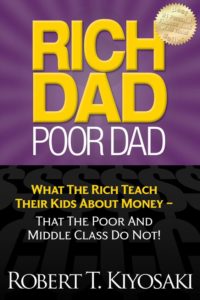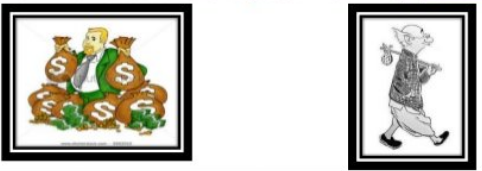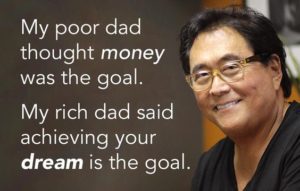Rich Dad, Poor Dad: What The Rich Teach About Money – That The Poor And Middle Class Do Not!
Author: Robert T Kiyosaki
Genre: Self Help, Personal Finance

The largest selling personal finance book in history with the series having sold more than 40 m copies! The sub-title of the book says it all and its brilliance lies in changing our attitude, our perspective on money.
Robert’s own father (“Poor Dad”) was an average middle class parent: well educated, hard working, strong values but not very rich. While he influences Robert like all fathers do and guides him on many things, Robert decides that he will not take his father’s advice on money matters. So he turns to his friend’s father (“Rich Dad”) who was then a struggling entrepreneur but thought of money in very different ways.

How divergent were the two thinking? The middle-class dad said, “Study hard so you can find a good company to work for”. The rich dad said, “Study hard so you can find a good company to buy”. The former said, “The reason I am not rich is because I have to look after you kids”. The latter said, “The reason I must be rich is because I have you kids” And so on.
The Rich Dad explains that people’s lives are forever controlled by two emotions: fear and greed. Adults continue to work hard but always remain insecure about losing their steady stream of income. And even when they keep earning more, money is never enough because they start wanting more and expenses rise too. The rat race of most young couples instills a déjà vu moment: happily in love, then married and then suddenly expenses start creeping: dream house, then dream car, then dream holidays, then mortgages, then higher taxes, then kids, their dream education and savings. Amidst all this, life slips by.
The core message is that middle class spends on liabilities which they believe are assets (e.g. mortgage on house that does not go up in value, and blocks money that could be invested elsewhere). But the rich buy assets that generate an incremental income stream (e.g. starting a side business which does not require their physical presence; or, buying stock).

The other core concept is that it’s not about how much money you make, but about how much money you keep. Wealth is defined as a person’s ability to survive so many days forward. If we stopped working today, how long would we survive? And the book emphasizes that we must all learn financial literacy as against just educational degrees. Even in a job, focus much more on learning than on job security.
Becoming rich requires overcoming obstacles. The fear of losing it all, the cynicism of self-doubt and of others, the laziness in being proactive about managing money, arrogance that may hide our own ignorance, and other bad habits. We have to find a purpose, a cause that excites us. And also get good association, move with people who can coach and inspire us. And then make daily choices. And thus, Robert says, begins our journey to be truly wealthy!
I loved the book and recommend that every young person reads it. Unfortunately, our schools do not teach enough financial literacy that life demands. To be sure, there are critics of the book. As a salesman, Robert sometimes trades serious discussion for sensational one-liners (e.g. his first book was If You Want To Be Rich and Happy, Don’t Go To School… even though, on an average, education continues to the surest way to lead a richer life). And his own success in what he teaches is questionable. But that does not take away from what he is trying to tell us in a simple and entertaining way: that rich and poor often think about money in very different ways. And we need to master the thinking pattern of the rich.
Why should you read the book: Our schools and universities do not teach us enough about money. They focus on scholastic and professional skills, important to land a good job, but not really to go much beyond. Middle class parents brain-wash the kids too much around their own insecurities and risks, perhaps important for the large majority to survive but not giving large wings to ones with potential. This book explains what every young person should know about money, and does it in a highly engaging and fun way.
Goodreads Link: Rich Dad, Poor Dad by Robert T. Kiyosaki | Goodreads

 This information will never be shared with third party
This information will never be shared with third party
Very interesting
This is very true..society and mostly parents need to stop brainwashing parents saying education and working for someone is the way to go,because the world looses out on talent and entrepreneurs who if were nourished would make an impact in the society
This is so true ,parents need to start supporting kids dreams and not force their children to work for someone..but should teach them to be their own boss,So they can create wealth and legacy for the next generation
Taking care of your family is so interesting because it exposes your weakness as a parent. You want your kids to be what you were not able to become. You sacrificed everything for them, even go to an extend of denying yourself good things just for them to be able to get what will help (Education) them and their families. We need to teach our kids to start doing money for themselves not work for somebody else for them to get money. Teach them how to get a fish.